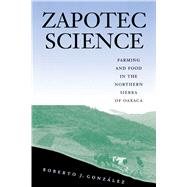Zapotec Science
, by Gonzalez, Roberto J.- ISBN: 9780292728325 | 0292728328
- Cover: Paperback
- Copyright: 8/1/2001
" Zapotec Science is a major triumph of ethnographic insights in the understanding of farming practices." -- Sustainable Communities Review "This is a superb ethnographic work that can, and should, revolutionize a good deal of anthropology and the philosophy of science.... For anyone interested in Latin American traditional agriculture, it will be a 'must read.'" --Eugene Anderson, Professor of Anthropology, University of California, Riverside Zapotec farmers in the northern sierra of Oaxaca, Mexico, are highly successful in providing their families with abundant, nutritious food in an ecologically sustainable fashion, although the premises that guide their agricultural practices would be considered erroneous by the standards of most agronomists and botanists in the United States and Europe. In this book, Roberto Gonzaacute;lez convincingly argues that in fact Zapotec agricultural and dietary theories and practices constitute a valid local science, which has had a reciprocally beneficial relationship with European and United States farming and food systems since the sixteenth century. Gonzaacute;lez bases his analysis upon direct participant observation in the farms and fields of a Zapotec village. By using the ethnographic fieldwork approach, he is able to describe and analyze the rich meanings that campesino families attach to their crops, lands, and animals. Gonzaacute;lez also reviews the history of maize, sugarcane, and coffee cultivation in the Zapotec region to show how campesino farmers have intelligently and scientifically adapted their farming practices to local conditions over the course of centuries. By setting his ethnographic study of the Talea de Castro community within a historical world systems perspective, he also skillfully weighs the local impact of national and global currents ranging from Spanish colonialism to the 1910 Mexican Revolution to NAFTA. At the same time, he shows how, at the turn of the twenty-first century, the sustainable practices of "traditional" subsistence agriculture are beginning to replace the failed, unsustainable techniques of modern industrial farming in some parts of the United States and Europe.







